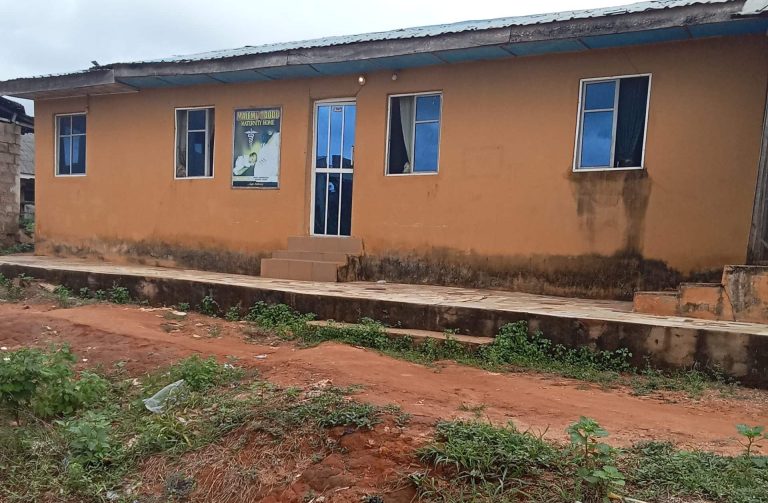The Nigerian government enacted the National Health Act, 2014, which stipulates that health centres should be available in every ward of each local government area of the federation. This has been breached in Iwelepe Community in Sagamu Local Government Area of Ogun State, where pregnant women, children and others continue to suffer avoidable deaths, injuries and other traumatic incidents. DAMILOLA ODUNUKAN, who visited the community, tells the gloomy story.
On September 24, a group of teenage boys gathered on a school field in the Iwelepe community to play football. Iwelepe is a community in Sagamu Local Government in Ogun State. A few minutes into the football match, a fight ensued between both teams. As the squabbling escalated, the owner of the ball, later identified as 16-year-old Jamiu Lasisi, grabbed and held onto it. He refused a particular newcomer, who joined the second team, to play. This soon led to a brawl between both teams.
Twenty minutes into the altercation, Jamiu’s younger brother ran like the hounds of hell were after him, and made a beeline for the house of the community Chairman, Mr. Apagun Olaolu.
Looking desperate and petrified, he pleaded with the Chairman to lend him his vehicle. He needed it to convey Jamiu to a hospital.
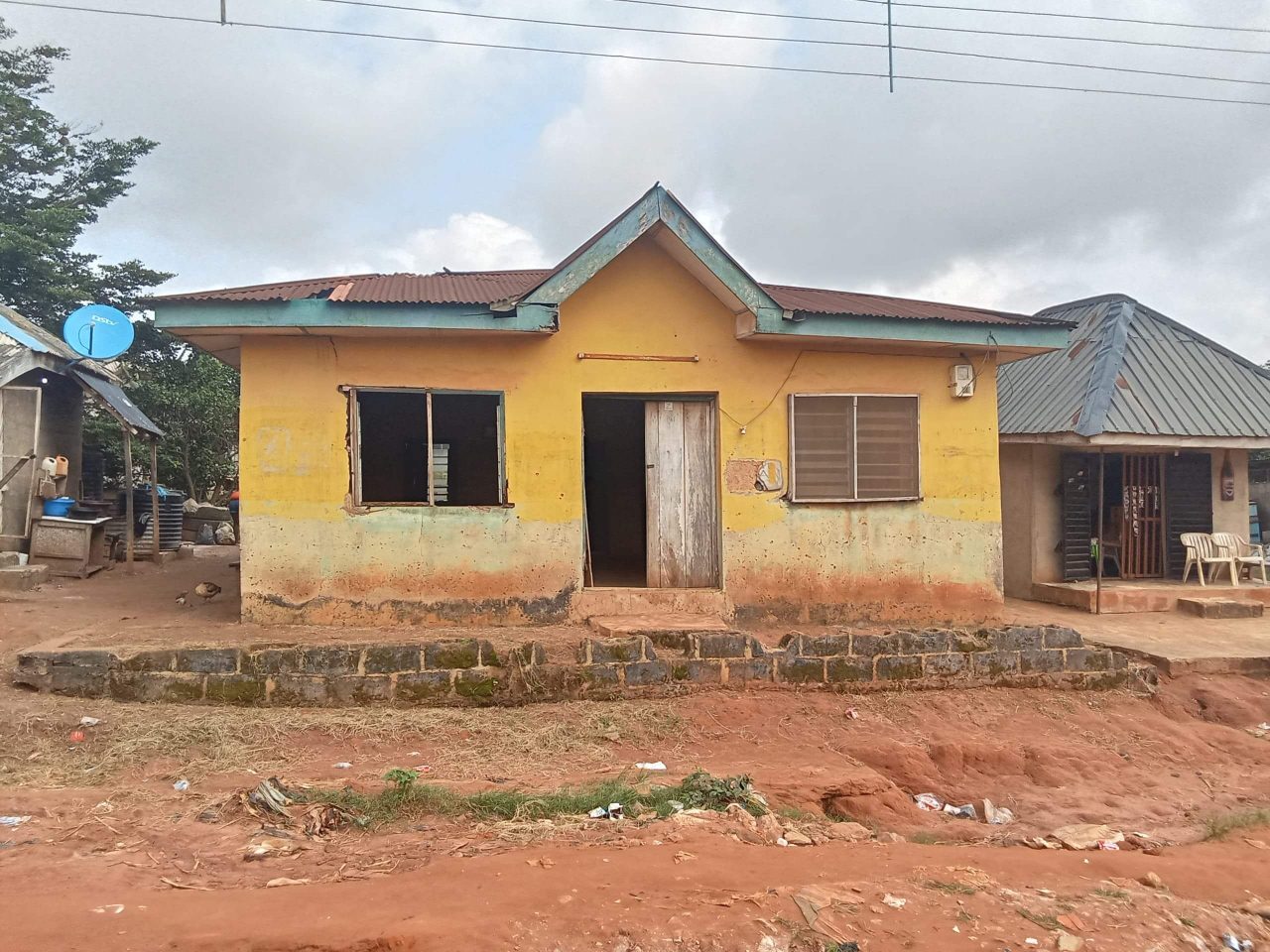
. Front view of the government-commissioned PHC in Iwelepe
The boy frantically explained, with the words falling over themselves, that Jamiu lost consciousness after being punched by another player during the fracas. Although the vehicle was provided, unfortunately, Jamiu died on the way to the hospital. The sad truth is that Iwelepe has no health centre and Jamiu was being taken outside the community before he died.
Many residents of Iwelepe Community believed that Jamiu would have been saved if there was a Health Centre. Jamiu’s case is just the tip of the iceberg. A good number of the residents have been suffering due to this lack.
Ogun State is unarguably one of the most industrialised States in Nigeria, housing major food and beverage companies, distilleries, one of the biggest pharmaceutical companies, and the pioneer wires, and cables manufacturing company in West Africa, among others. Despite its opulence in industrialisation, host communities have not benefited from opulence being raked in by these industries.
The moment a visitor arrives at the Kobape-Siun-Sagamu Interchange that links three States: Lagos, Oyo, and Ogun, the person is welcomed by a beverage company leading to the state capital, Abeokuta. To the Southern hinterland of the country is another big pharmaceutical company occupying a large expanse of land.
Also Read:
- Mission X: Super Falcons, Zambia in flaming quarter-final war in Casablanca
- UBA’s LEO becomes Africa’s first chatbot to enable cross-border payments
- Ekiti has spent over N4b to fix electricity supply, says Oyebanji
- Sir Kesington Adebutu bids farewell to Awujale of Ijebuland
- 56-year-old Australian grandma gives birth to twins with 39-year-old Nigerian husband
Iwelepe Community members have often prayed that the industries they see around them could help them in building a befitting health centre, especially since they had lost hope in the state and local governments. Since the government and industries have failed the people, incidents of deaths like that of Jamiu, which could have been avoided, continued to happen. Jamiu is one of the latest in the growing statistics of avoidable deaths in Iwelepe.
Recalling the death of Jamiu at such an age, Olaoluwa sighed loudly as he battled to control his emotions and gathered his thoughts. He recounted: “I was at home when Jamiu’s brother rushed down to me, shouting and crying that I should help them with my car; they wanted to rush Jamiu to the hospital in town. Unfortunately, Jamiu died on our way to the hospital.”
Eyewitnesses would later claim that one of the players punched Jamiu on his neck region. “The punch threw Jamiu off-balance. He fell to the ground, unconscious,” Olaoluwa.
Death and other health threatening incidents have been plaguing Iwelepe for decades and the residents, including pregnant women, children and elderly, are now left at the mercy of patent medicine store owners, local midwives and unprofessional bone-setters for basic healthcare services.
Friday Asekomhe, 48, a resident of the community, narrated his near-death experience. He received a call from a neighbour at his store, which is located at the Old Sagamu Tollgate, to sell packaged water to customers at about 11pm on August 5, 2024. Asekomhe chartered a commercial cyclist to take him to his destination. Motorcycles are mostly the means of transportation in the community for residents.
Asekomhe recalled: “I beckoned on the cyclist; he is someone I know; he stopped and that is how I mounted his motorcycle. We’ve not gone too far when I suddenly heard a bang! Before I knew what was happening, the cyclist and his motorcycle crashed to the ground. I also fell with him. As I struggled to stand, I heard another sound; this time it was like a metal was slammed on my hand. I staggered and did not look back as I tried to escape.”
It turned out to be a robbery attack and men rushed out from bushes around the Iwelepe tollgate road. The robbers failed in robbing Asekomhe, but they left a lasting mark on him. Asekomhe said: “I struggled and got up. I ran! I was ascending the hill after Church Road when I met another set of guys. I started shouting: Thief! Thief! Thief! I ran into an uncompleted building and kept silent so that they would not detect me. Meanwhile, my cries had attracted the people in the neighbourhood. The community people soon came out with machetes. They would later rescue me.”
He added that he was not aware of the damage that was done to his hand until much later. It was gory to behold. Neighbours also grimaced in shock and tried to tie a tourniquet to stop the blood gushing out from his hand, but their efforts were futile. The motorbike rider, on the other hand, did not sustain much injury during the robbery attack.
Asekomhe said that the heavy metals the robbers used to slam his hand left him with bruises and a dislocated radius – forearm. This made him stay awake with the neighbours until the following morning, which was August 6. When it was dawn, the challenge of getting him to the hospital to stop the bleeding started. There was also fear that the attackers could still be lying in wait in the bushes.
He recalled: “I writhe in pain all night. At first, I thought I was going to die, seeing the amount of blood gushing out of my hand. I wept like a child all night.”
One would think that with the pain Asekomhe went through, he would be attended to by a medical professional, but he said went to a local bone-setter, fondly called Daddy Chinese. He stated: “When we got there, he told me the bone had shifted and that was why I was in so much pain. He said he would massage it.” However, the pain got worse and Asekomhe, headed for another unprofessional local bonesetter within the community.
After a series of local medical applications without improvement, Asekomhe went to Sagamu for an X-ray and the journey for a new treatment began. After about a week of patronising unprofessional healthcare workers and poor management of the bone injury, Asekomhe had a glimpse of hope upon his visit to the Owokoniran Memorial Hospital, which is about 30 minutes drive from the community. At the clinic in Sagamu, the hospital conducted an X-ray and told Asekomhe that he had a dislocation. Asekomhe recalled that the healthcare workers at the hospital told him that he would have to spend some days monitoring his hand for proper medical attention, which he refused for personal reasons.
Many members in the community are the mercy of quacks and unprofessional healthcare service providers. Many of them live in fear. Like Asekomhe and Jamiu, residents must travel far to access the basic healthcare facility, which is against the National Health Act.
The National Health Act
The Federal Government of Nigeria, in 2014, through the National Assembly, enacted the Nigeria Health Act No 8. This bill, which was signed into law by former President Goodluck Jonathan on December 9, 2014, stated in Act 1 (2f) that the Federal and State Government shall be responsible for the village’s health. This implies that every village in Nigeria shall have access to basic healthcare, which is the primary healthcare service provided for by the State government, as it was stated in the Act.
In addition to this, Act 3(2d) says that children, women, old people and vulnerable persons, persons with disabilities shall have access to free healthcare services.
Olaolu, the community CDA Chairman, said the administration of former Governor Gbenga Daniel commissioned a community project as a dividend of politics, which was supposed to bridge the gap of the lack of a health centre in Iwelepe Community almost two decades ago. The facility, however, has become an abode for domestic animals and is channelled to other uses other than its primary purpose.
Olaolu also recounted the challenges the residents encounter in accessing healthcare. His words: “Ours is a community with over 1,000 houses without a single health centre. Also, bad road networks are another problem. To access the hospital in town, it’s a terrible situation. We are calling on Governor Dapo Abiodun-led administration to come to our aid.”
Olaolu said he has also experienced the nightmare that comes with not having a nearby clinic in the community. It happened in 2017. He said: “Sometimes in January 2017, after the New Year’s Day celebration, I asked my son to wash my car. He washed the car, and sometimes at dusk, he started complaining of pains and his breath became shallow. I gave him Ventolin, even though we said we would stop administering it whenever he had a crisis. He was asthmatic. We had no choice on that fateful day. It was already late and Sagamu is far from here, coupled with no hospital in our community. We thought we could manage it before daybreak, but before dawn, we lost him.”
Need For Basic Healthcare
Primary health centres in rural areas are important in managing health crises, especially in times of epidemic or pandemic. Dr. Ifeanyi Nsofor in his explanation on the need for Primary Health Centres, said PHCs must be provided in every ward as it is the bedrock of the healthcare system, the reason being that non-emergency health cases are managed and attended to at the PHCs. In addition to this, Dr. Nsofor reiterated that the importance of PHCs could not be overlooked as it was essential in educating people on how to live and maintain a healthy lifestyle because of its proximity to the people in communities.
More importantly, the presence of PHCs in rural areas and communities helps to reduce the influx of people at secondary and tertiary health facilities. In addition to this, it helps to reduce the overstretching of the State and Federal Governments facilities across the state as explained by Nsofor. Consequently, it helps to reduce workload on health practitioners in these facilities.
The presence of health centres in rural or underserved communities plays a significant role in helping to offset the workload in the health industry, especially on doctors and nurses in secondary and tertiary health institutions as Gabriel Oke explained in his reports. The availability of PHCs helps people to have easy access to affordable and quality healthcare as stated by Oke in a research journal: “Without Health We Are Nothing.”
The Medical World Nigeria, in 2019, reported that the then National President of the Nigeria Medical Association, Dr. Francis Faduyile, argued that lack of primary health centres leads to overstretching health professionals, leading to doctors and nurses working overtime and in turn taking a toll on their mental and physical health. Faduyile added: “Within this year, we have had cases in which doctors had overworked themselves, slumped and died while at work. Some of them have done surgery for many patients and they get so exhausted and passed out.”
According to the WHO, PHCs are established to bring health closer to communities. However, based on statistics by the BCPHR, only 20 percent of the 30,000 PHCs in Nigeria are functional. Meanwhile, out of the 157 health centres in Ogun State, Sagamu Local Government Area has only eight accredited health centres serving a population of 214,558 as stated by States Worldometer.
Ogun State lags behind in meeting the World Health Organisation standard in terms of healthcare provision for individuals. This is evident in the lack of primary centres in the Iwelepe community as lives have been cut short in the absence of adequate health facilities.
Another incident of a parent losing their child is that of Ifeoma Ignatius, a woman with a hearing disability. Eyewitnesses in the community said Ignatius had gone to the farm with her daughter, Stella, who, at the time, was about five years old, to collect maize and firewood. A neighbour explained that Ignatius came out from the farm, which was close to her residence, screaming and crying. No one could understand her gesticulation or why she was crying.
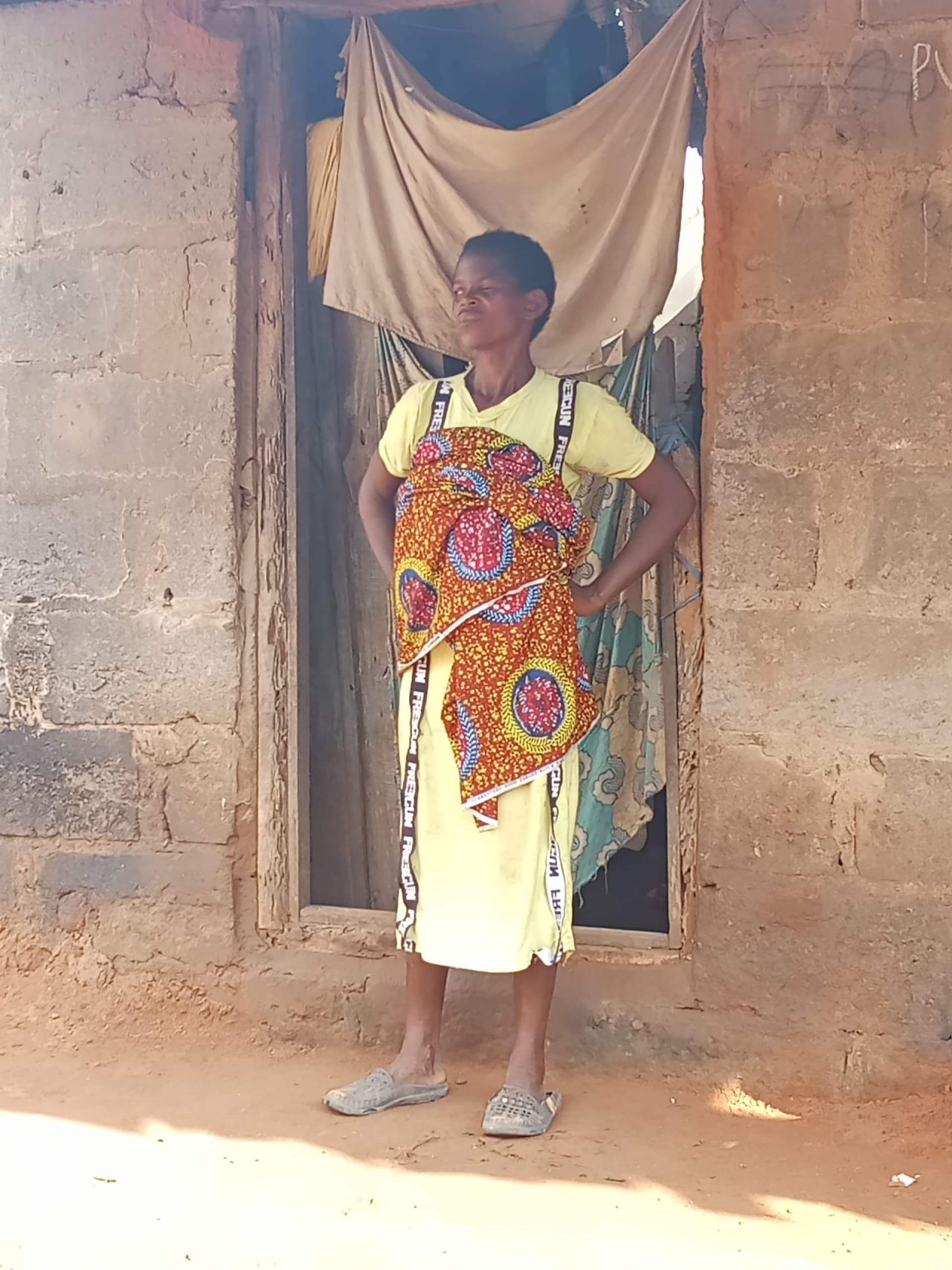
. Ifeoma Ignatius
However, the neighbour deciphered that her daughter was in danger. The neighbour, who preferred to be called grandma, said: “She started screaming ta-ta, that was when I knew her daughter was in danger. I understood her demonstrations by the way she shaped her hands. I knew she was looking for her daughter. We all followed her into the bush and looked for Stella, but we could not find her.”
The following week after the community members had searched for Stella to no avail, a farmer, simply identified as Anthony, went to check on his crops on Monday, and there he saw a little girl, lying on the farm. He raised the alarm and the villagers ran to the scene, carried the child and handed her over to Ignatius who began to tend to her daughter in the house without seeking professional medical assistance. She continued with the self-medication even after seeing that the child had lacerations on her body.
Grandma added that Stella was left with Ignatius, who at the time had been abandoned by her husband. Stella, according to eyewitnesses, developed some strange symptoms in her body, where water started coming out of her body. She became bloated. “A few weeks, almost two months after being found on the farm, water started coming out of Stella’s body. She also began to swell, so much that a hand could sink into her skin if you touched her then,” Grandma recalled. Little Stella, after two months of battling to stay alive, died.
According to Grandma, Ignatius has been abandoned by her family because of her disability, and her husband was a lazybones. Therefore, there was no one to assist her with the medical bill to attend a hospital outside the community.
Maternal and infant mortality is another major challenge in the community as women in the community visit a private midwife to access ante-natal care and even help out during labour. Majemu Ododo is one of the ill-equipped maternity centres in the community. Inside this maternity centre, there is a table and a chair with the photograph of the midwife hung on the wall beside a framed certificate of the Ogun State Midwives’ Association. A few plastic containers, bottles and a stethoscope were seen in the small room.
The proprietor of the maternity hospital refused to grant an interview and claimed that she reports to the Ogun State Board of Primary Healthcare in Oke-Mosan, Abeokuta, the state capital. Outside the maternity centre was a signage: “Majemu Ododo Maternity.”
It was at this maternity centre that Vivian Akubor spent 22 hours of labour in pain sometime in January 2023. Akubor narrated: “I could not go elsewhere because that was the only place I registered. I started having pain, so I left home at about 9pm. It was not easy. I didn’t give birth that day. I gave birth at 7pm the following day. The midwife was scared, and she said if I didn’t give birth, she would have to send me to another hospital. This was after she inserted her hands in my private part to check the cervix dilation and put on a drip.”
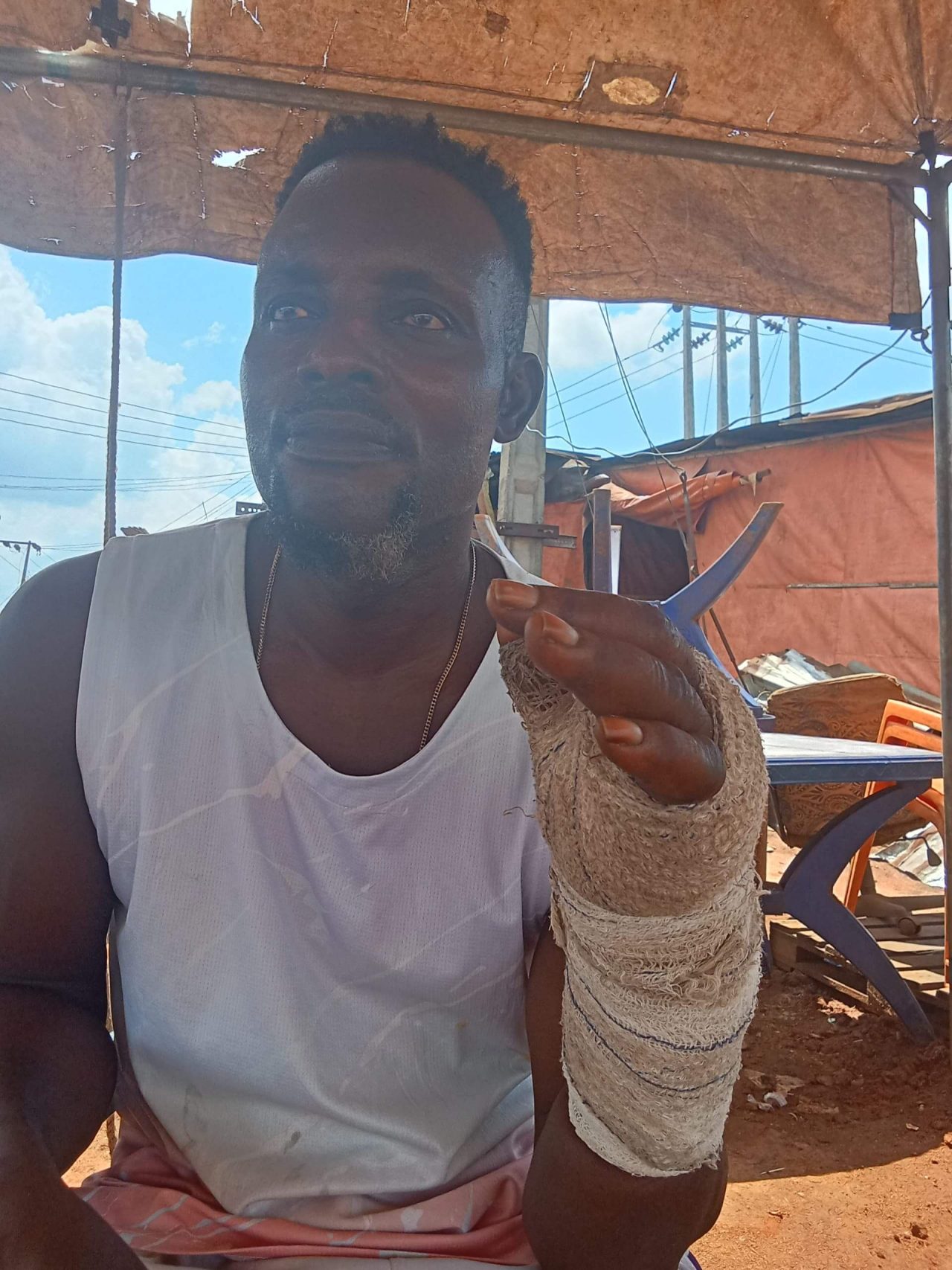
. Asekhome Akubor
Akubor said the midwife administered a “hot injection” and intravenous fluid on her during this horrific period, but she did not state specifically whether the midwife wore hand gear during the insertion. She was one of the fortunate women who escaped maternal mortality due to lack of quality maternal healthcare, despite paying a sum of N30,000 to the midwife, who aided her during her child delivery process.
Dr. Hauwa Muhammed, Nigeria’s Director for Liverpool School of Tropical Medicine, addressed the alarming rate of maternal and child mortality rate in Nigeria in 2023 as the country accounts for 10 percent of the world’s maternal mortality as at May 2024. This affects about 40 million Nigerian women of childbearing age.
Moreover, Dr. Natalia Kanem emphasised the need for investing in women’s maternal health by filling in the global shortage of 900,000 midwives in which Nigeria takes a huge share on the global stage. The World Health Organisation statistics stated that lack of basic healthcare and good nutrition are parts of maternal mortality in low-income countries.
On the other hand, Fareedah Raimi shared her experience on August 8. She decried the lack of maternal healthcare within the community and hoped that the government would come to their aid. On August 12, Raimi delivered her baby at a maternity centre owned by a woman, whom she described as Iya Nurse in the community. She said she left home at about 8pm and gave birth around 12am without complications.
These women, after delivering their babies, will have to travel kilometres to access immunisation for their children. This, according to Agnes Ene, costs them a lot, especially in the middle of a hike in prices of transportation due to fuel price increases. Agnes, a mother of two, said she visited the primary health Centre in Sagamu to access immunisation services for her second child. She said: “It used to cost me so much to go to the health centre, so I would have to trek to the tollgate to be able to afford the fare to the health centre in town.”
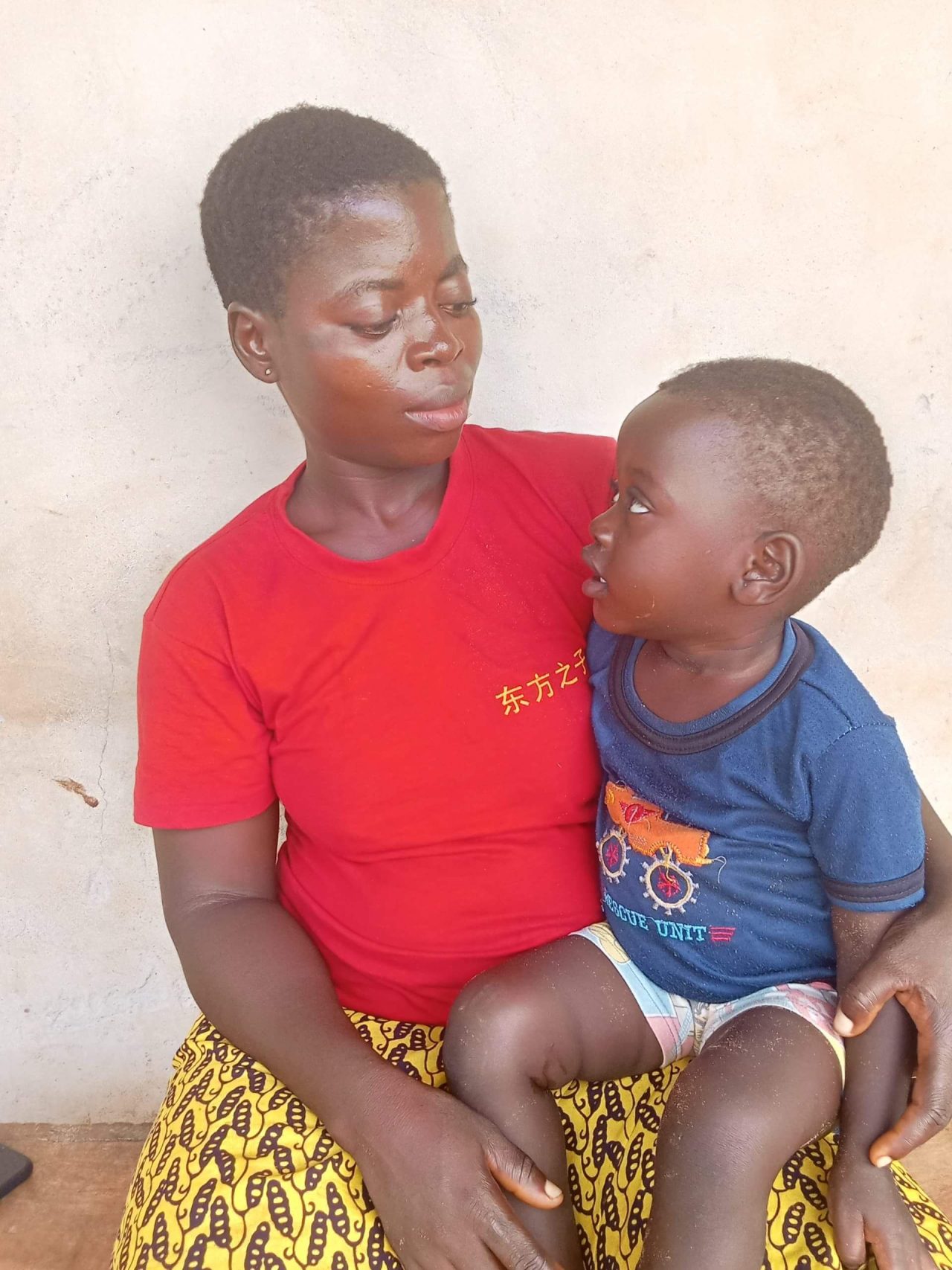
. Agnes Ene with her baby
Agnes, like many other women who hope to give their children immunisation, would have to trek a long distance out of the community to be able to afford to visit the clinic to access healthcare services for their babies.
Sagamu Local Government Response
There have been claims by the community leader of addressing a series of letters to the Sagamu Local Government Area under which the Iwelepe community is, pleading for a Health Centre. Olaolu said that the community could not meet the conditions the Sagamu Local Government Area gave to them before they could be considered for a primary health centre. This was why they lacked health centres, said Olaolu.
He said: “We wrote a letter to them; they told us to provide land in the community where we want them to build a health centre. They also asked us to provide two auxiliary nurses for the facility. They said they will send us one qualified nurse whom they will only pay, while the community will pay the two auxiliary nurses.”
Olaolu added that the community pleaded with the local government to equip the abandoned health centre in the community built during the Otunba Daniel administration, while the community would hire a qualified healthcare official to attend to the health needs of the people. He shared how every effort to make the LG work with them failed under the guise of “no space in the defunct health centre”, adding: “They told us that the place is too small, we should look for a bigger portion of land.”
However, efforts to reach the Sagamu Local Government Area officials have been futile.
State of The Defunct Health Centre
The defunct Primary Health Centre lies on a small portion of land in the community. The road that leads to the PHC is already engulfed by erosion. In front of the defunct PHC is a ditch. The defunct PHC is a three-room bungalow, painted in yellow and green on the exterior. The roof looks good. In the reception was a wooden table and two benches during the time of visit.
On the other hand, inside two rooms on the right side of the structure lay a clay pot, and a metal bunk-bed. Facing the waiting room were two tiny rooms with tiled floors. These looked more like bathrooms. There is no toilet or septic tank in or around the defunct PHC.
However, outside the structure was a huge black plastic tank suspended on a metal platform with the inscription: “Hon. Adeniran Ademola Adeyinka, (Sapele),” right at the back of the building.
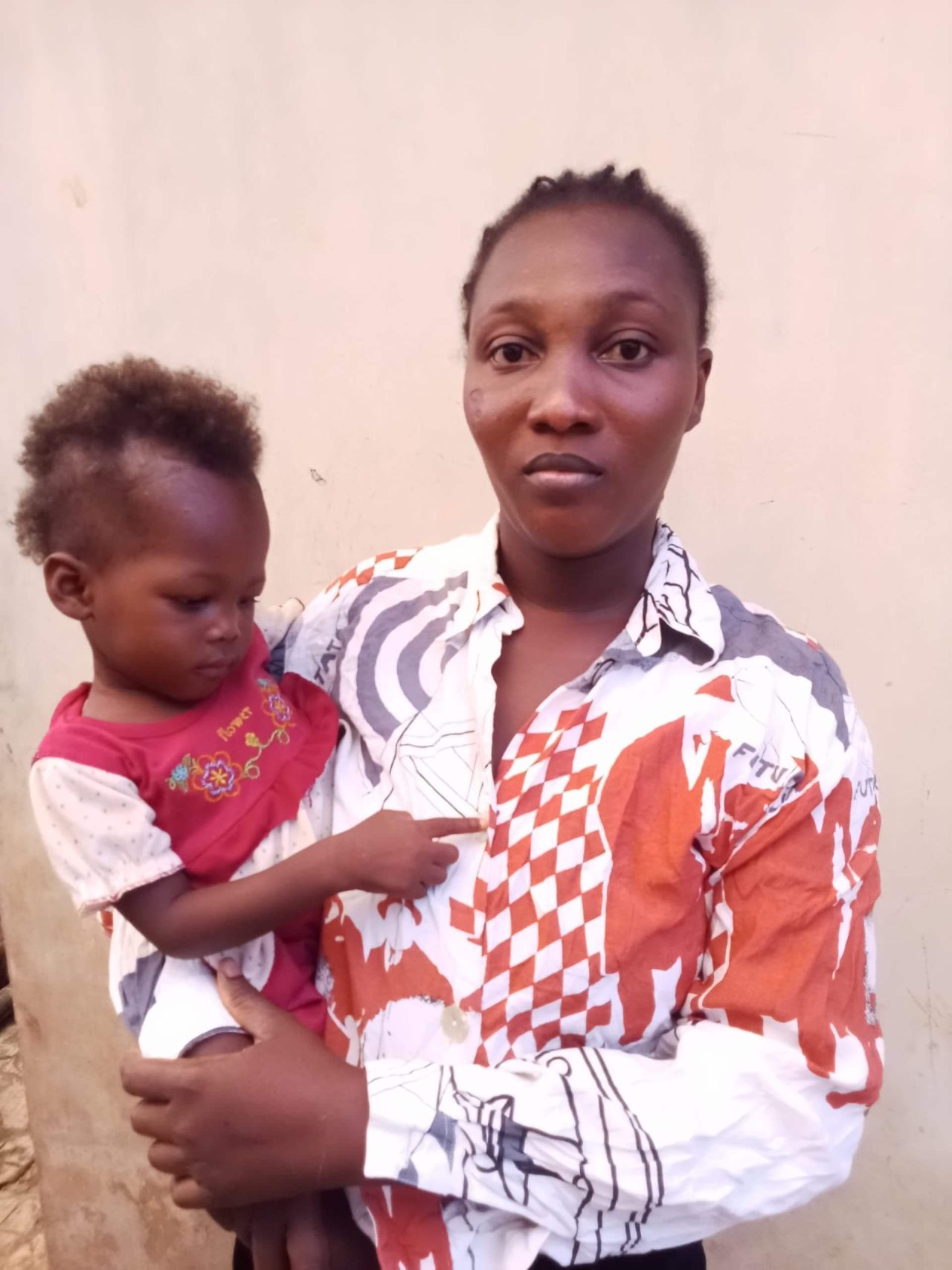
. Vivian Akubor with her daughter
Since the lack of PHC, people like Joseph Okoro, 50, have resorted to receiving health care from a local patent medicine store adjacent to his house. Okoro, whose left eye is almost gouging out, said he has not been able to care for his deteriorating eye for almost a decade. Okoro recounted that he has not visited the hospital in the last three years because the proceeds from his farm work could barely provide for his family. So, he resorted to the “nurse: near his house in the community.
“The nurse asked me to go to the hospital, but I don’t have money to do that now, so I just leave it like that. Although I still see faintly, the eye is still manageable,” Okoro said.
A Patent Medicine Store dealer, otherwise called a chemist, Iremide, said the major illness she treats is malaria. The owner of the store, Abisola Adewale, said: “Sometimes, they bring babies here; they complain about their children’s temperature. Men, women, even pregnant women come here to make complaints and symptoms of some illnesses and we prescribe medicines for them and tell them to return after three days. But when the case is beyond what we can handle, we direct them to a hospital in town.”
In the same vein, the Ogun State Government has not made much effort despite the visit of the former Minister of Health for State, Dr. Tunji Alausa, to the Ogun State Ministry of Health on March 11, 2024, when he paid a courtesy visit to the community. The aim of the visitation bordered on the Federal Government’s intervention scheme in providing adequate support for the state’s health sector and promised “to facilitate the uplift of health centres in all nooks and crannies across Ogun State” with the improvement of the budget allocation for health.
The Ogun State government, however, has not fulfilled the requirements of the law by providing the needed healthcare for the community. The local government was contacted for the verification of the claims made by Olaolu as regards the community providing land and hiring healthcare workers before they would be considered qualified for a health centre.
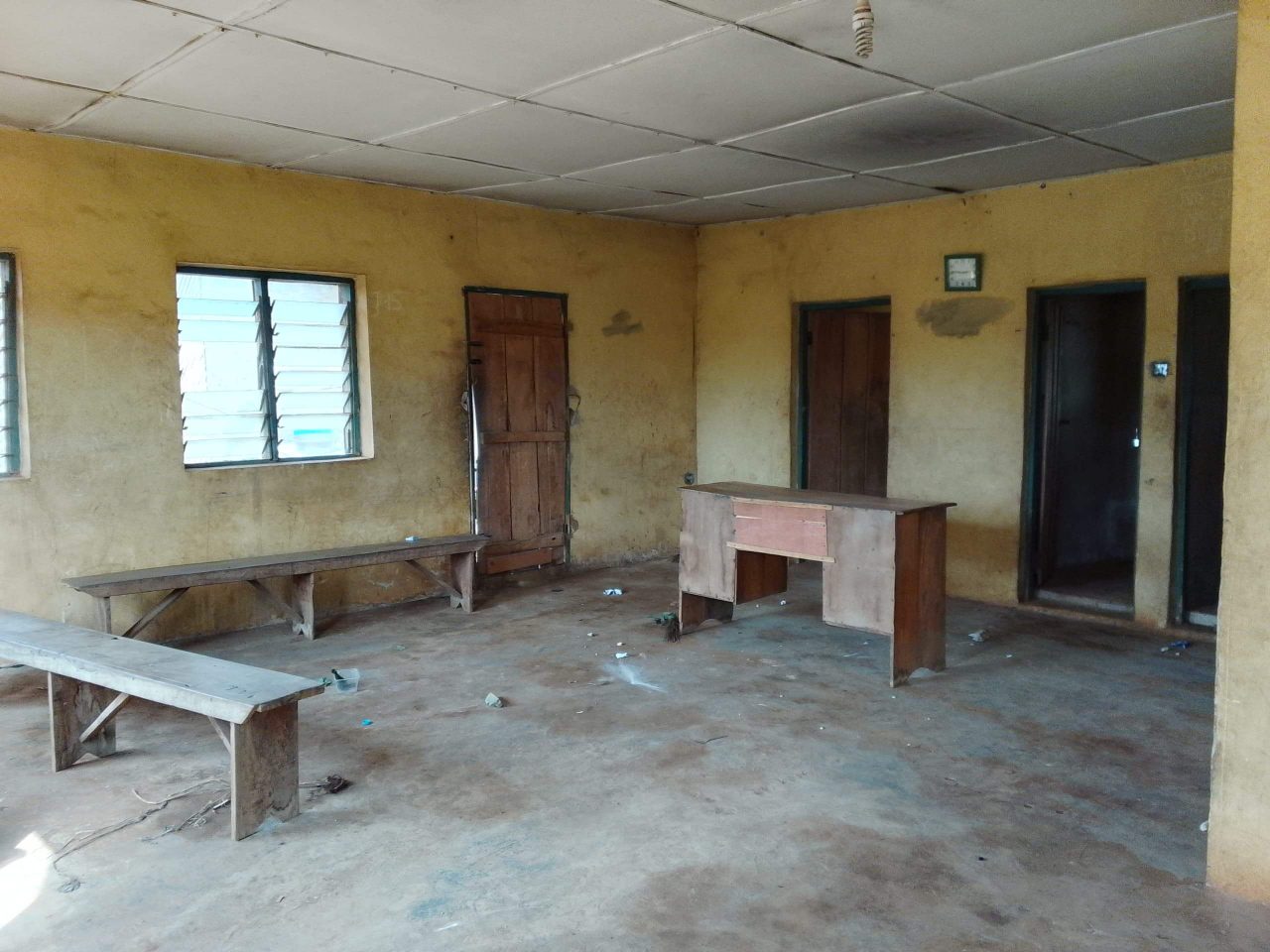
. Entrance to the defunct PHC commissioned by the government
Staff at the Sagamu Local Government Area hinted that it would be difficult to get the required file and letters written by the community begging for the health centre, especially if the date the letter was addressed to them could not be traced. The source further stated: “It will be difficult to have access to the information you are requesting. However, I will try as much as possible to verify your claim from the Administrative Department provided you tell me the date the letter was brought here and the content of the letter.”
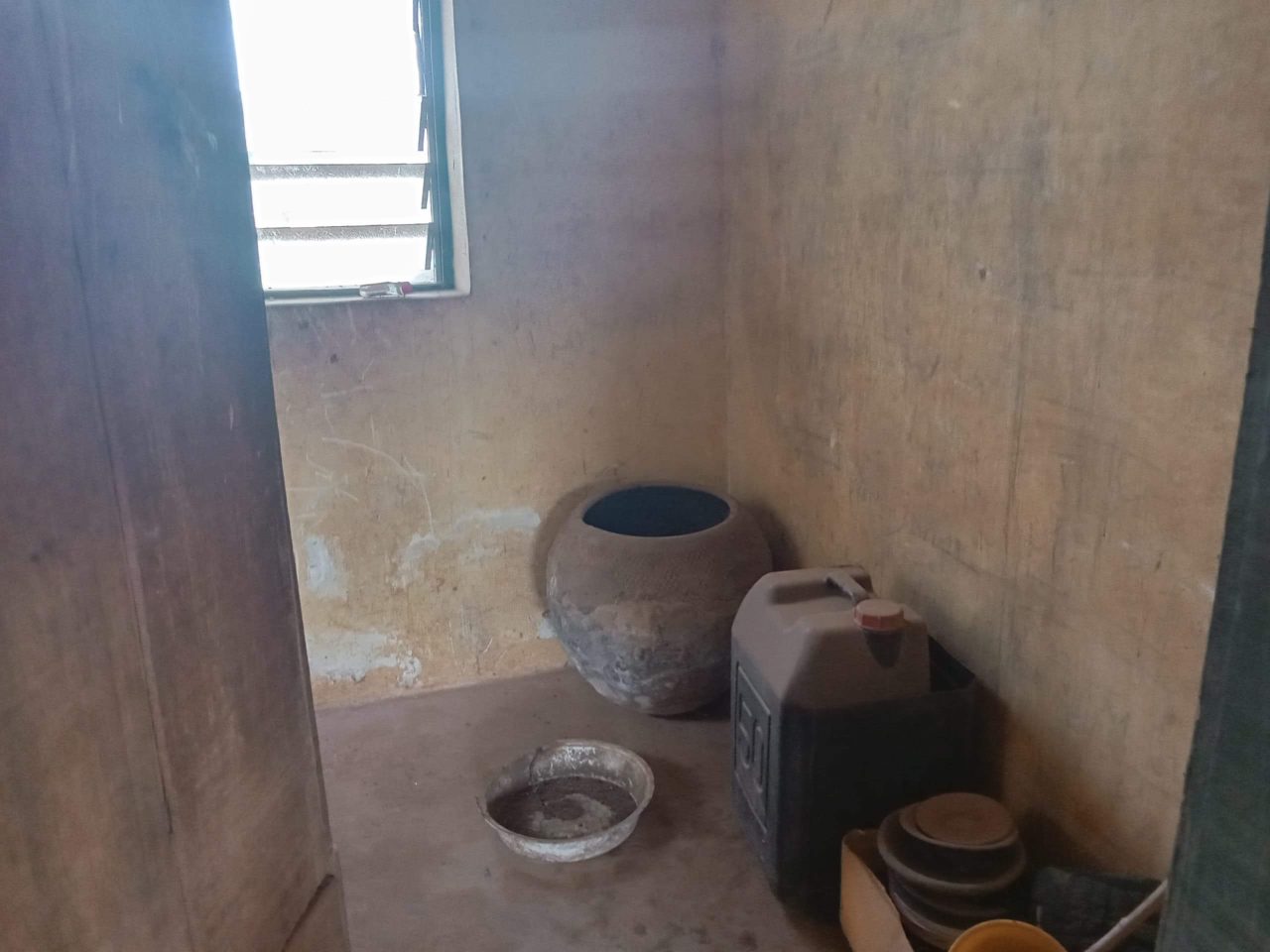
. A room in the abandoned PHC
After several attempts to verify the response that the Local Government Area gave to the community to be able to trace the letter addressed to them, Olaolu said that he could not find a duplicate copy of the letter that was addressed to the LG. He said that it was not just that he could have misplaced it, but also because it had been long.


